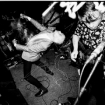When word got out about Daughters' abrupt breakup in 2009, many fans were in a state of disbelief. The Rhode Island–based "artcore" experimentalists — who since 2002 had earned an infamous reputation for their aggressive noise rock and confrontational live shows (which often featured excessive nakedness ... and bodily fluids) — had just put the finishing touches on their third, self-titled album, a veritable masterpiece of cacophonous heaviness.
Underneath the spoken-word vocals of Alexis S.F. Marshall — who had evolved to David Yow levels of weirdness — was a new sense of groove and melody fused to a maelstrom of squealing, frenetic guitars and relentless rhythms.
Older listeners might have been polarized, but critics were overwhelmingly positive. Daughters, it seemed, had come into its own with an even more unrivaled style. But behind the scenes, the band was unraveling. Endless touring, financial hardships and interpersonal tensions had made for a toxic atmosphere. Marshall and guitarist Nicholas Andrew Sadler eventually refused to work together. (Outside of one secret show at the Rhode Island School of Design, the band wouldn't perform in support of that self-titled album until several years later.)
"We never took time away, and things just kind of came to a head," Marshall says. "[We were having] a very minor conversation — about who we'd go on the road with — and it was kind of a mean-spirited interaction. And I just said that I didn't want to do it anymore. I had just gotten sober and was trying to devote myself and my time to things that were a bit more positive. Being out and sleeping in strange places and doing drugs and drinking ... I just decided that I was done. And the longer that I was away, the less that I thought about it."
But Andy Low of the record label Robotic Empire — which released Daughters' first album, the 11-minute Canada Songs — wasn't giving up. A good friend to both Marshall and Sadler, he convinced each member in 2013 that the other wanted to bury the hatchet. When the former bandmates got together for dinner, they quickly realized the ruse — but moved forward anyway.
"As soon as Nick and I got together, it was just very natural," Marshall says. "We just started talking about it like we hadn't been away. I always had a strange relationship with Nick. We didn't speak for quite a while. But it was just needed. We're kind of a little crazy. [Laughs] We needed to stop for a little while for everyone's mental health and physical health. None of us could see it at the time."
The result of that rekindled relationship is You Won't Get What You Want, the band's first new material in eight years, released this October on Ipecac. Working once again with bassist Samuel M. Walker and drummer Jon Syverson, Marshall and Sadler assembled 10 new tracks that stretch Daughters' sound even further into left field. At nearly 49 minutes, it's easily the longest recording of the group's discography, pieced together via hundreds of DropBox demos with all four members living in different parts of the country.
Like anything related to Daughters, however, the final result didn't come easily. Dissatisfied with material for a 2015 EP that "felt forced," the members had scrapped a number of songs and gone back to the drawing board — all while Sadler dealt with an unknown health condition.
"I had been struggling with undiagnosed Lyme disease for years," Sadler says, "and at the time [of the 2015 recordings] was in a fog of prescription psych meds that made it nearly impossible to think, be conceptually creative, maintain appropriate energy levels or focus long enough to process what we were making and hearing. It was a bad time, but I'm grateful it unfolded as it did because it pushed me to try harder. It was one of many moments that led me to weaning off of an unintentional physical dependence on Ativan, and an eventual Lyme diagnosis."
The new LP certainly doesn't suffer for creativity. Daughters long has colored its music with metallic, alien effects, and You Won't Get What You Want is no exception. This time, however, the tonal palette is even more expansive and dark, with Sadler's strings and assorted keyboards sounding more like an electric eel or industrial machinery. There's a distinct emphasis on sonics and moderate tempos rather than raw energy, but the groove that permeated the band's 2010 album is just as central.
For much of the album, Marshall yelps, grunts and moans like normal, but his howls often are deeper or overlaid — adding more Nick Cave to that David Yow — and are noticeably more restrained from the LP's opening moments, the sparse electro-industrial dirge "City Song."
Two tracks later, seven-minute lead single "Satan in the Wait" delivers more firsts: one of Daughters' most deliberate and sludgy tempos, with a downright melodic passage that sounds like a glockenspiel run through an effects chain. It isn't until the fourth track, "The Flammable Man," that the band's trademark mix of whirring guitars, dissonant melodies and blazing rhythms makes an appearance.
"There are no real synths on the album," Sadler says. "I did utilize various digital components, often in the form of inexpensive keyboards with unique tones. Most of the time, though, our music reflects an effort to combine combatant guitar combinations with a specific vision for production.
"I wasn't 100-percent sure of what we needed to make," he continues. "There was an intuition for it in me, but I knew that what we were making [in 2015] gave me no creative satisfaction, addressed none of my present needs as a musician and, as a listener, exemplified none of the assets I like about the music of others. I felt beholden to no expectation and knew that we needed to continue to grow our abilities and overall sound."
How crowds react to the new material is anyone's guess, but they'll have even more change to contend with: a much less outlandish live performance. Daughters shows from the aughts are things of lore, with Marshall playing entire shows naked, bleeding or barfing onstage, drinking bottles of piss or even "flossing" his ass with a mic cable. His tour-life debauchery played a major factor, often showing up to venues fully intoxicated, but boredom was just as much a contributor.
"I was just so fucked up then," Marshall says. "Part of it was that I was trying to keep myself interested and entertained. Jon had told me just a few years ago, 'Oh, this show that we played? The sound guy wanted to fucking murder you …' because I put a microphone up my ass or something. And, 'Oh, the last time we were in Belgium, you jerked off on something and stuck something down your throat, and I had to talk people out of [beating you up]. So I look back and think, 'Jesus, how did I survive and no one kicked my head in?'"
"Sometimes the audience was inconsequential," he continues. "I just wanted to disgust myself. I just wanted to be this grotesque animal. Now I'm interested in singing, and strangely, there's a part of me that doesn't know how to perform. I'm really still trying to figure it out.
"[I'm] ten years [sober] now. It's changed my perspective on just about everything in my life. It's more enjoyable now that I'm aware of what's happening to me and who I'm talking to and having personally more fulfilling experiences. There's a lot of life, and when you're all fucked up, you're missing it. It makes for great stories, and I know that people love that shit. People can romanticize failure of self. I'm an addict. I'll be an addict my whole life. It's not like I'm not an alcoholic. How I deal with it, that's the trick. That's addiction and mental illness."
But regardless of what everyone thinks of this "new and improved" Daughters, the band has garnered a surprising amount of interest given its relative obscurity. Touring in support of the LP this fall, the group had to add second dates to shows in Chicago, New York and Los Angeles because of how quickly they sold out. It's all been a pleasant shock to the four members, whose "real-life" responsibilities include tour managing (Syverson), working as a brewmaster (Walker), raising children (Marshall) and commercial scoring, managing a rehearsal studio and being a secular member of a Christian worship band (Sadler).
And even though all four are spread between Rhode Island, central Pennsylvania and Austin, Texas, they intend to prioritize Daughters in addition to their other bands. Not that they give a shit what you want out of their art.
"Nobody has to do anything for you," Marshall concludes. "Daughters doesn't have to do anything for you. This is what we do, and if you like it, that's wonderful. But we want to be happy with what we're doing, and everything else comes second."












